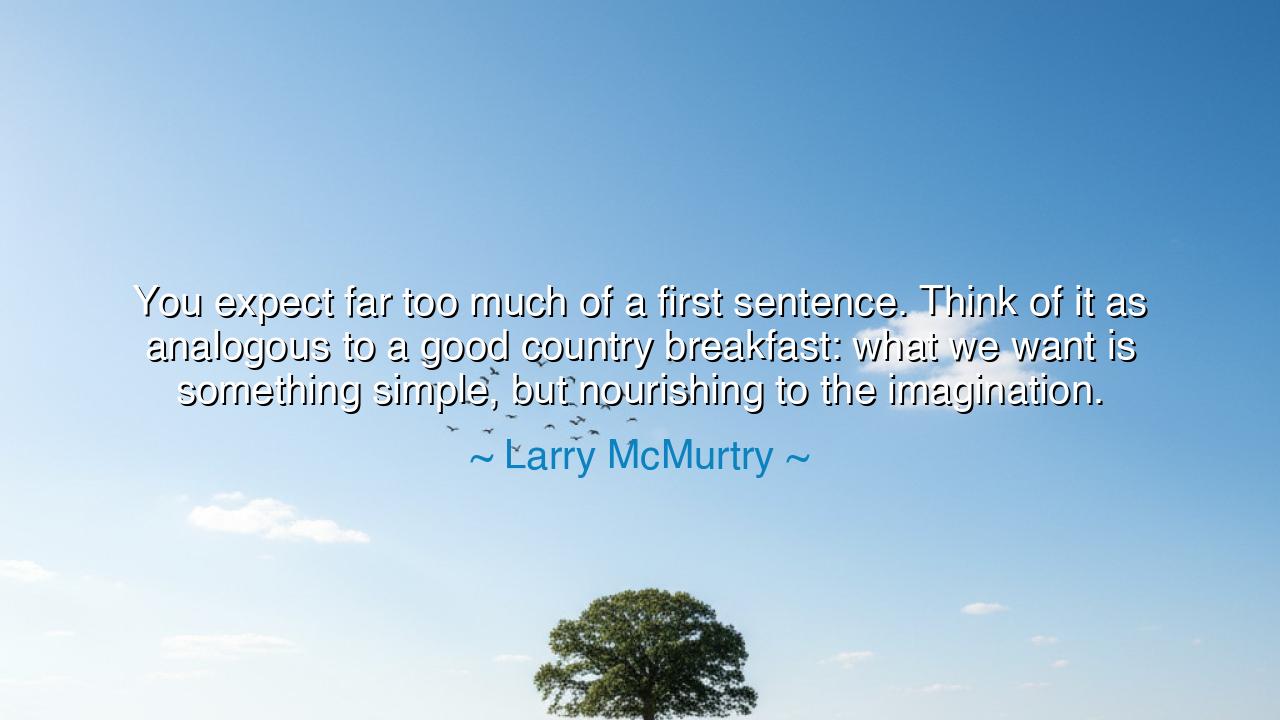
You expect far too much of a first sentence. Think of it as
You expect far too much of a first sentence. Think of it as analogous to a good country breakfast: what we want is something simple, but nourishing to the imagination.






When Larry McMurtry wrote, “You expect far too much of a first sentence. Think of it as analogous to a good country breakfast: what we want is something simple, but nourishing to the imagination,” he was speaking as a craftsman of words, but also as a sage of patience. His message is one of humility and balance—a reminder that creation, whether of art, work, or life itself, begins not with perfection, but with simplicity. In this gentle wisdom, McMurtry invites us to see that greatness often begins quietly, like the dawn rising over the plains: modest, calm, yet filled with the promise of the day.
The origin of this reflection comes from McMurtry’s own lifelong relationship with writing and storytelling. Known for his works that capture the American West—its vast landscapes, its solitude, and its humanity—he understood that imagination does not thrive under pressure or pretense. The first sentence, in his eyes, was not a monument to brilliance, but a seed. Like the country breakfast he describes, it need not dazzle; it must sustain. It must awaken the imagination, not overwhelm it. For in nourishment lies the power to continue—to write, to dream, to build. McMurtry’s wisdom reminds us that creation is a journey of steady nourishment, not a single moment of perfection.
In his comparison to a good country breakfast, McMurtry evokes the image of the rural morning—the warmth of sunlight filtering through the window, the scent of coffee and bread, the honest meal that prepares the body for labor. Such a breakfast is not elaborate, but it gives strength. So too should the first act of creation—be it a sentence, a painting, or a plan—feed the mind and spirit, giving them energy to carry forward. In our hunger for greatness, we often forget that imagination grows best when it is gently nurtured. The simple act of beginning, grounded in sincerity and purpose, is far more powerful than the strained pursuit of grandeur.
There is an ancient echo in McMurtry’s thought. The philosopher Lao Tzu once wrote, “The journey of a thousand miles begins with a single step.” McMurtry, in his own way, speaks the same truth through the language of art. Many young writers, he observed, place impossible weight upon the first sentence, believing it must carry the full majesty of their vision. But this burden crushes the spirit before the journey has begun. The wise know that beginnings are fragile things—they must be treated with kindness. A first sentence, like a first step, need only move forward. It does not need to reach the end.
Consider the story of Harper Lee, who labored for years over her novel To Kill a Mockingbird. The opening lines of her book are simple, almost unassuming, yet within them lies the quiet pulse of humanity that carries the entire story. She did not begin with brilliance, but with truth—with a voice that rang genuine. From that modest start, the story grew into one of the most cherished works of the twentieth century. Her first sentence, like McMurtry’s country breakfast, nourished both writer and reader alike—plain, heartfelt, sustaining. From simplicity, greatness was born.
McMurtry’s wisdom, though born in the realm of writing, extends to every act of creation. Too often, we expect the first attempt at anything—be it love, art, or change—to be perfect. We demand of ourselves a masterwork before we have even begun. But life does not unfold in perfection; it unfolds in process. The imagination, like the body, must be fed daily. To demand brilliance too soon is to starve it. The truest works, the truest lives, are built not in a single flash of genius, but in the slow and steady nourishment of small beginnings.
So, my listener, take this teaching into your heart: begin simply, but begin. Let your first sentence, whatever it may be, be honest and alive. Do not weigh it with fear or vanity; let it serve as a meal for the soul, sustaining enough to move you forward. Whether you are a writer, a dreamer, a builder, or a seeker, remember that every great work begins not with perfection, but with imagination fed by faith.
For as Larry McMurtry teaches, the first sentence is not a performance, but a promise. It is the morning meal that gives strength to the long labor of creation. Make it simple, make it nourishing, and the rest will follow. The greatness of any work—indeed, of any life—lies not in its beginning’s brilliance, but in its endurance, its honesty, and its quiet power to sustain the imagination until the day’s end.






AAdministratorAdministrator
Welcome, honored guests. Please leave a comment, we will respond soon